小学六年级下册一般过去时PPT(精讲)
六年级下册英语-小升初总复习-时态全解-人教版PEP(共29张PPT)
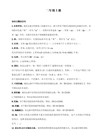
将来时理论
一、 概念:表示将要发生的动作或存在的状态及打算、 计划或准备做某事。 句中一般有以下时间状语: tomorrow, next day(week, month, year…),
soon, the day after tomorrow(后天) this morning , this afternoon , this evening等。
试题演练:
三、 选择正确的答案。 B presents for my parents yesterday. 1. I ____ A. buyed B. bought C. buying C 2. Susan _____ swimming yesterday. A. go B. goes C. went B 3. Danny _____ breakfast five times last week. A. eat B. ate C. eated C Tree Planting Day. 4. Last Sunday____ A. is B. were C. was
试题演练:
一、写出下列动词的过去式或动词原形。 went was 1. go_______ 2. is___________ Lorem ipsum dolor bought 3.buy_______ 5. have had ____
sit amet, consectetur adipisicing elit, sed do eiusmod tempor incididunt ut labore
swam 4.swim__________
6. watched watch _____
eat 7. ate______
get 8. got__________
一般过去时(讲义)-人教PEP版英语六年级下册
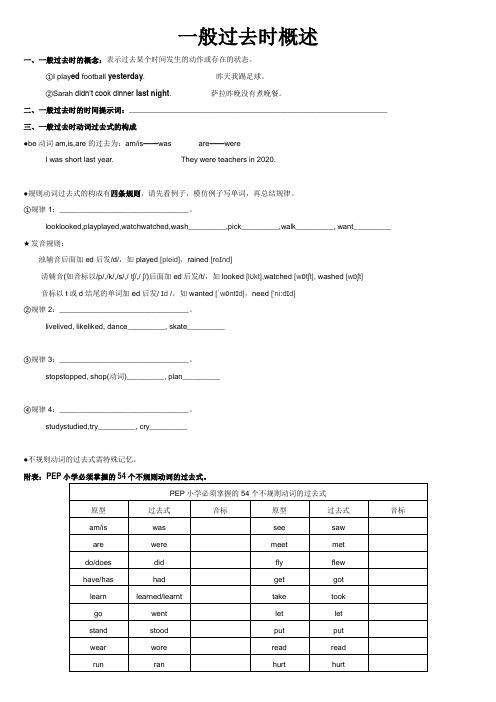
一般过去时概述一、一般过去时的概念:表示过去某个时间发生的动作或存在的状态。
①I play ed football yesterday. 昨天我踢足球。
②Sarah didn’t cook dinner last night. 萨拉昨晚没有煮晚餐。
二、一般过去时的时间提示词:______________________________________________________________三、一般过去时动词过去式的构成●be动词am,is,are的过去为:am/is——was are——wereI was short last year. They were teachers in 2020.●规则动词过去式的构成有四条规则,请先看例子,模仿例子写单词,再总结规律。
①规律1:_______________________________。
looklooked,playplayed,watchwatched,wash_________,pick_________,walk_________, want_________ ★发音规则:浊辅音后面加ed后发/d/,如played [pleid],rained [reɪnd]清辅音(如音标以/p/,/k/,/s/,/ tʃ/,/ʃ/)后面加ed后发/t/,如looked [lʊkt],watched [wɒtʃt], washed [wɒʃt]音标以t或d结尾的单词加ed后发/ɪd /,如wanted [ˈwɒntɪd],need ['ni:dɪd]②规律2:_______________________________。
livelived, likeliked, dance_________, skate_________③规律3:_______________________________。
stopstopped, shop(动词)_________, plan_________④规律4:_______________________________。
六年级下册英语-小升初英语专题精讲 时态-一般过去时 全国通用PPT精美版

句型转换
课堂练习
1. l usually go to the park. (用yesteday 替换usally 改写句子)
二、一般过去时的构成
新知讲解
2、没有be动词的一般过去时的构成
没有be动词的一般过去时由动词的过去式构成。在构成否定句及疑同句
时一般都借助助动词 did.原来的动词改为原形,句末加问号。例如:
陈述句:I dropped my ice cream!我掉了我的冰淇淋!
一般疑问句: Did you drop your ice cream?
【专题课件】小升初英语专题精讲
第二十讲 时态-一般过去时(超全精编版)
新知导入
一、一般过去时的概念及作用 1.一般过去时表示过去某个时间发生的动作或存在的状态,常和表示过 去的时间状语连用。例如:
我妈妈的手提包刚才在沙发上。 My mother's handbag was on the sofa just now. 上周我们去了农场。 We went to the farm last week.
课堂练习
用所给动词的适当形式填空. 1. My cousin_g_a_v_e_ ( give) me a present yesterday. 解析:句子中有yesterday,意思是昨天,所以句子发生在过去,用一般 过去时,故填gave。
课堂练习
用所给动词的适当形式填空. 2.We_w_e_r_e_ (be) on the farm last Friday. 解析:主语是we,be动词选择are,因为句子中有last Friday,意思是上 周五,所以句子发生在过去,用一般过去时,故填were。
否定句: I didn't drop my ice cream!
英语人教版六年级下册《一般过去时》
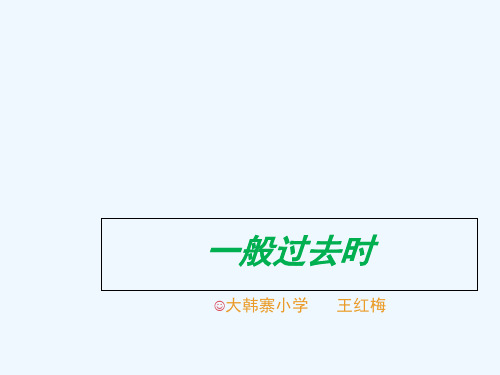
大韩寨小学
王红梅
一、一般过去时肯定句构成
1、主语+was/were + 表语。 eg: He was quiet before. eg: You were short 3 years ago. 2、主语+动词过去式+宾语。 eg:My uncle went to Shanghai yesterday.
二、一般过去时否定句构成
1、主语+was/were+表语。此时直接在was/were后面加not即可。
He eg:
主语+wasn't/weren't+表语。 was quiet before. (改为否定句形式) He wasn't quiet before. were short 3 years ago. (改为否定句形式) 即可。 You weren't short 3 years ago. 主语+didn't+动词原形+宾语。
My eg:
三、一般过去时一般疑问句构成
1、主语+was/were eg: eg:
+ 表语。此时需要把was/were 提前即可。
Was/Were + 主语+表语? He was quiet before. (改为一般疑问句句形式) Was he quiet before? They were short 3 years ago. (改为一般疑问句句形式) Were they short 3 years ago?
2、主语+动词过去式+宾语。此时需要用到助动词did置于句首,并且后面的谓语动词要用原形。
Did +主语+动词原形+宾语?
六年级一般过去时 ppt课件
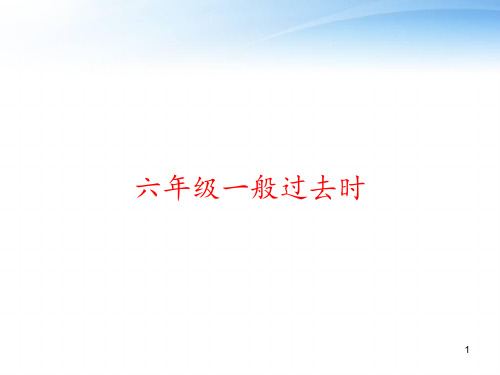
笨,没有学问无颜见爹娘 ……” • “太阳当空照,花儿对我笑,小鸟说早早早……”
4
过去式的句子结构
1.主语 + be(was/were) 2.主语 + -ed
5. 13. do ______ 14. teach _______ 15. win ______
6. 16. like _______ 17. write _______ 18. cry ______
7. 19. study _____ 20. ask __________ e ______
7
3、辅音字母加y结尾,把y改成i,在加-ed
study---studied carry---carried
下面的动词过去式变化对吗?
× × × stay---staied play---plaied say---saied
stayed
played
said
8
4、以重读闭音节结尾的动词,末尾只有 一个辅音字母,双写这个辅音字母再加-ed。
六年级一般过去时
1
过去式
表示过去 时间内发生的
标志词
1、yesterday, last week/year/month… the day before yesterday,
just now等 2、two years ago
at that time before等
3、in +过去年份
2
精品资料
• 你怎么称呼老师? • 如果老师最后没有总结一节课的重点的难点,你
13
6. We ___ to the zoo and __a lot of animals yyeesstteerrddaayy. A. go; see B. went; saw C. goes; sees
小学六年级下册英语小升初时态课件(通用版) 一般过去时总复习2

4.疑问was/were调句首
• Were you at home the day before yesterday﹖ • Was she happy this morning﹖
肯定回答 Yes, 主语+was/were. 否定回答 No, 主语+wasn't/weren't. Were Xiao Qiang and Xiao Long here just now﹖
• yesterday或以其构成的短语: • yesterday morning • yesterday afternoon • yesterday evening • the day before yesterday
three days ago
Miss Zhu went to Tiantian Market three days ago.
其他家族
Long long ago
yesterday Now
一般过去时 yesterday ago just now in the old days in those days in 1980 the other day at that time once upon a time
一般将来时
现在 进行
• 现在学过的常用的表示过去的时间状语有: just now,a moment ago,yesterday,last week,last night, last weekend,last year,last month,three days ago,two weeks ago,five years ago…
• (3)末尾只有一个元音字母和一个辅音字母的重读闭音节,应 双写末尾的辅音字母,再加-ed,如:stop-stopped, shop-
小升初 六年级英语语法 一般过去时 动词过去式 课件ppt

3.They _____ in the USA last year.They _____ in China
now.
A.are ; were B.were ; are
C.was ; are
D.were ; was
Listen carefully
4. 实意动词过去式的变化规则
I walk to school every day.
一起练练吧
写出下列动词的过去式
like -- ______
do -- ______
dry -- ______
drop -- ______
think -- ______
know -- ______
sit -- ______
sleep -- ______
Listen carefully
一起练练吧
用动词的适当形式填空。 1)I _____ (have) an interesting party last weekend. 2)He _____ (watch) TV and _____ (read) a useful book yesterday. 3)They all _____ (go) to the mountains yesterday morning. 4)His father _____ (be) a taxi driver five years ago. 5)I _____ (take) some pictures yesterday.
我们就不:listen -- listened open -- opened visit -- visited
Listen carefully
口 诀:
• 过去式很简单,前提必须是动词 • 结尾有e只加d • 辅y结尾也不难,把y变i加ed • 末尾双写有哪些,辅音元音辅音记 • 其他动词很随和,带上ed成过去
小学六年级英语一般过去时
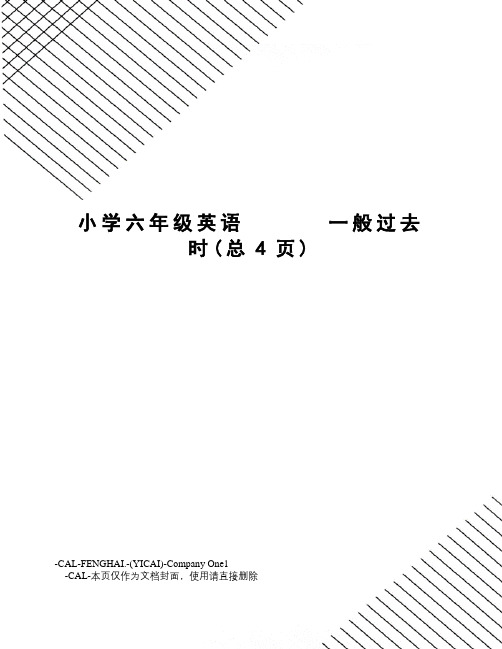
小学六年级英语一般过去时(总4页)-CAL-FENGHAI.-(YICAI)-Company One1-CAL-本页仅作为文档封面,使用请直接删除第十七讲一般过去时一. 概念一般过去时表示过去某个时间发生的动作或存在的状态,常和表示过去的时间状语连用。
一般过去时也表示过去经常或反复发生的动作。
例句:watched TV last night.我昨天晚上看电视。
did you do yesterday?你昨天做了什么?went to Beijing last year.他们去年去了北京。
二.用法1.表示过去发生的动作或状态,通常会有明确的表示过去的时间状语。
I went to the zoo yesterday.I stayed up last night.2.叙述过去连续发生的动作或状态。
This morning , I got up early , went out for a walk , then came back and cooked for my family .3.表示过去某一段不确定的时间内发生的动作或状态。
He worked in the store for 5 years.三.Be动词在一般过去时中的变化1. am 和is在一般过去时中变为was。
(was not=wasn't)2. are在一般过去时中变为were。
(were not=weren't)3. 带有was或were的句子,其否定、疑问的变化和is, am, are一样,即否定句在was或were后加not,一般疑问句把was或were调到句首。
四.句中没有be动词的一般过去时的句子1.否定句:didn't +动词原形,如:Jim didn't go home yesterday.2.一般疑问句:在句首加did,句子中的动词过去式变回原形。
如:Did Jim go home yesterday?3.特殊疑问句:疑问词+一般疑问句?如:What did Jim do yesterday?五.动词过去式变化规则1.一般在动词末尾加-ed,如:pull-pulled, cook-cooked2.结尾是e加d,如:taste-tasted3.末尾是辅音字母加一个元音字母和一个辅音字母的重读闭音节,应双写末尾的辅音字母,再加-ed,如:stop-stopped4.以“辅音字母+y”结尾的,变y为i,再加-ed,如:study-studied六.真题再现( ) 1. The boy the tree last week.A. is wateringB. watersC. watered2. I _____(see) his name in the newspaper yesterday.因为句中出现了表示过去的时间状语last week和yesterday,所以正确答案分别为:1. C精点精练一、用动词的适当形式填空。
六年级一般过去时

just now 刚才
• • 主语+谓语 •
• •
be动词(was,were) 助动词(did) 情态动词(could,might) 实义动词(有确切含义的动词,可
以单独做谓语,如:played 等)
例如: • They were happy. • He played football. • You did your homework.
used lived woke kept said cleaned bought played learnt/ed saw read stopped
ran run borrow borrowed grew grow watch watched wrote write smiled smile
open begin swim carry study finish
一般过去时
1.定义: 一般过去时态表示过去某个时 间发生的动作或存在的状态,在表 示过去一段时间内经常或反复发 生的动作或习惯状态,也用一般 过去时,在一般过去时,动词用 其过去式形式,不受主语人称和 数变化的影响。
谓语变化
规则动词过去式的构成
1、一般词尾加-ed。 stay→stayed help -- helped ask -- asked look→looked 2、e结尾的只加-d。 hope→hoped dance -- danced love -- loved live→lived
• III.句型转换 – They came to China in 1990.(变一般疑问句) Did come • __________ they ________ to China in 1990? • 2.I was ill for two days last week? (同上) • ________ Were you ill for two days last week? • 3. The twins go to school on foot every day. (同上) Do go • _________ the twins _______ to school on foot every day? • 4.She washed the clothes last Sunday. ( 变否定句) wash the clothes last Sunday • She _________ ________ didn’t
新人教精通版六年级英语下册:Unit 1 Lesson 1--一般过去时的知识点-课件
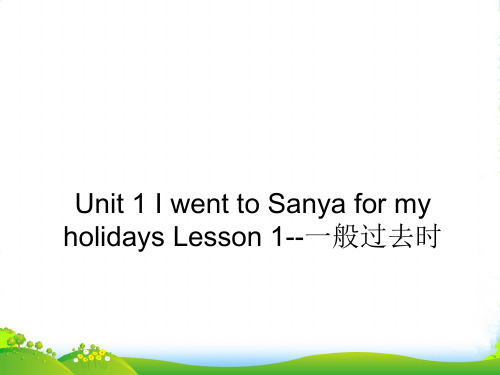
肯定句: They swam in the lake yesterday.
否定句: →They didn’t swim in the lake yesterday.
一般过去时否定句练习
肯定句: They made a kite a week ago. 否定句:They didn’t make a kite a week ago.
in 1990 just now (刚才) long long ago(很久以前)
• (2)They were in Li Yan’s home last night.
• → Were they in Li Yan’s home last night? • (一般疑问句)
• →Yes, they were. (肯定回答) • →No, they weren’t. (否定回答)
Unit 1 I went to Sanya for my holidays Lesson 1--一般过去时
past now
future
动词过去式 的构成
规则动词
regular verbs
不规则动词
irregular verbs
规则动词 过去式的构成
1、一般在动词末尾加– ed
look
look ed
肯定句: He was ill yesterday. 否定句:He was not ill yesterday.
肯定句:The cat ate a bird last night. 否定句:The cat didn’t eat a bird last night.
一般过去时的 一般疑问句
一般过去时_小学六年级英语
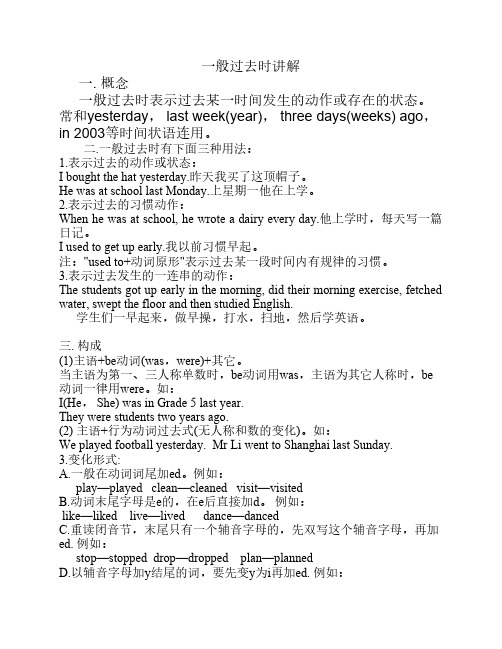
一般过去时讲解一. 概念一般过去时表示过去某一时间发生的动作或存在的状态。
常和yesterday, last week(year), three days(weeks) ago,in 2003等时间状语连用。
二.一般过去时有下面三种用法:1.表示过去的动作或状态:I bought the hat yesterday.昨天我买了这顶帽子。
He was at school last Monday.上星期一他在上学。
2.表示过去的习惯动作:When he was at school, he wrote a dairy every day.他上学时,每天写一篇日记。
I used to get up early.我以前习惯早起。
注:"used to+动词原形"表示过去某一段时间内有规律的习惯。
3.表示过去发生的一连串的动作:The students got up early in the morning, did their morning exercise, fetched water, swept the floor and then studied English.学生们一早起来,做早操,打水,扫地,然后学英语。
三. 构成(1)主语+be动词(was,were)+其它。
当主语为第一、三人称单数时,be动词用was,主语为其它人称时,be 动词一律用were。
如:I(He, She) was in Grade 5 last year.They were students two years ago.(2) 主语+行为动词过去式(无人称和数的变化)。
如:We played football yesterday. Mr Li went to Shanghai last Sunday.3.变化形式:A.一般在动词词尾加ed。
例如:play—played clean—cleaned visit—visitedB.动词末尾字母是e的,在e后直接加d。
第四章 时态 第3节 一般过去时(课件)通用版英语六年级下册
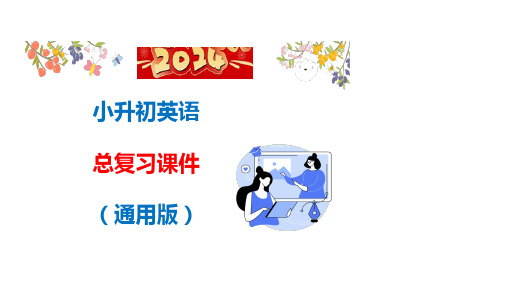
A.plant
B.will plant
C.planted
知识点2 一般过去时的形式
一般过去时的形式如下:
形式
结构
例句
I was very happy yesterday. 含be动
第一人称单 昨天我非常开心。 词的一
数/第三人称 He/She was a doctor last year. 般过去
单数+was 去年他/她是一名医生。 时
It was sunny yesterday.昨天天气是晴朗的。
形式
结构
例句
You were a good student last year. 含be动词 第二人称单
去年你是个好学生。 的一般过 数/各人称复
We/You/They were very happy yesterday. 去时 数+were
一般
其他?
昨晚你熬夜了吗?
疑问
肯定回答:Yes,主语+did. —Yes,I did.是的,我熬夜了。
句
否定回答:No,主语+didn’t. /No,I didn’t.不,我没有熬夜。
句式
结构
例句
①—Where were you last Friday? ①特殊疑问词+
上个星期五你在哪里? was/were+主语+
[点拨] 1.该陈述句变为一般疑问句时,应借助助动词did,把 did放到句首主语之前,把原句中的谓语动词saw还原成see。回 答时肯定用Yes,主语+did.;否定用No,主语+didn’t.。
2.肯定陈述句变为否定陈述在动词前加didn’t,并还原动词。
—I was in the school.我在学校里。 特殊疑 其他?
一般过去时(课件)人教PEP版英语六年级下册

时间标志词
例子
? yesterday系列 la?st系列 a?go系列
yesterday, the day before yesterday last week, last month, last year two months ago, a moment ago(一会之前)
? 其他表示过去的时间词 in 1990, in those days, just now (刚刚)
写出下列动词的过去式。
want _w_a__n_te__d_ play_p__la__y_e_d__ love_lo_v_e__d__ stop _st_o_p__p_e_d_ study_st_u_d__ie_d_ talk _ta__lk_e_d____
wash _w__a_s_h_e_d__ help_h_e_l_p_e_d__ cry_c_r_ie__d___ dance_d_a_n__c_e_d_ plan _p_la__n_n_e_d_ climb _c_li_m__b_e_d___
主语
I
肯定句
v.过去式
He/She/It/ Tom
v.过去式
You/We/They/ 名词复数 v.过去式
Practice
(C ) 1. I ______ an English teacher now.
A. is B. was
C. am
D. were
(B ) 2. She _______ happy a moment ago.
am/is--wams /isa-r-ew-a-ws ereare--wdeore/does--did meaakt-e--a-tme ade
read--read
句型结构 1
六年级(下)英语公开课-总复习 一般现在时和一般过去时句型人教PEP课件下载

+表语?
精编优质课PPT六年级(下)英语公开课 -总复 习 一般现在时和一般过去时句型人教PEP 获奖课 件推荐 下载
精编优质课PPT六年级(下)英语公开课 -总复 习 一般现在时和一般过去时句型人教PEP 获奖课 件推荐 下载
不含BE动词的句型
(主语是第一,二人称及第三人称复数)
一般现在时用来表示习 惯性,经常性发生的动 作.eg:
一般过去时用来表示在过
去的时间里发生的动
作
.
eg:
I went to work by bus
I go to work by bus yesterday.
everyday.
you watched TV last night.
you watch TV everynight.
we play basketball on the weekends.
精编优质课PPT六年级(下)英语公开课 -总复 习 一般现在时和一般过去时句型人教PEP 获奖课 件推荐 下载
主语是第三人称单数
(肯定句)
He goes to work by bus everyday. He went to work by bus yesterday.
She watchesTV everynight.
精编优质课PPT六年级(下)英语公开课 -总复 习 一般现在时和一般过去时句型人教PEP 获奖课 件推荐 下载
精编优质课PPT六年级(下)英语公开课 -总复 习 一般现在时和一般过去时句型人教PEP 获奖课 件推荐 下载
6. I _________ (have) an exciting party last weekend.
4.
What____ (do) he usually ____ (do) after
小学六年级 语法:一般过去时
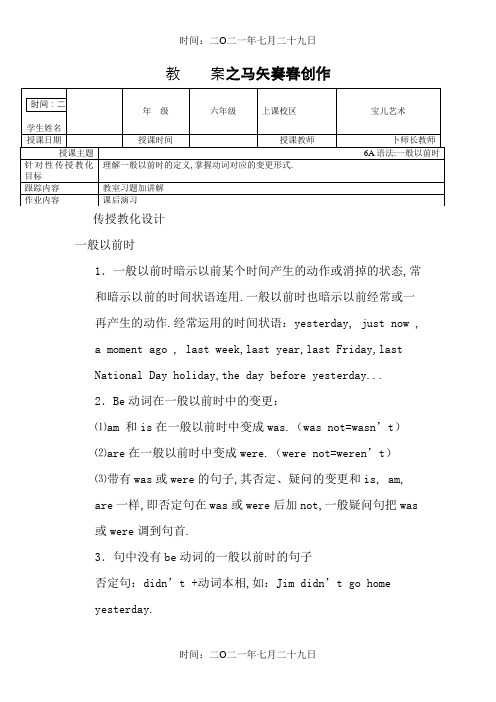
教案之马矢奏春创作传授教化设计一般以前时1.一般以前时暗示以前某个时间产生的动作或消掉的状态,常和暗示以前的时间状语连用.一般以前时也暗示以前经常或一再产生的动作.经常运用的时间状语:yesterday, just now ,a moment ago , last week,last year,last Friday,lastNational Day holiday,the day before yesterday...2.Be动词在一般以前时中的变更:⑴am 和is在一般以前时中变成was.(was not=wasn’t)⑵are在一般以前时中变成were.(were not=weren’t)⑶带有was或were的句子,其否定、疑问的变更和is, am,are一样,即否定句在was或were后加not,一般疑问句把was 或were调到句首.3.句中没有be动词的一般以前时的句子否定句:didn’t +动词本相,如:Jim didn’t go homeyesterday.一般疑问句:在句首加did,句子中的动词以前式变回本相.如:Did Jim go home yesterday? 特殊疑问句:⑴疑问词+did+主语+动词本相?如: What did Jim do yesterday?⑵疑问词当主语时:疑问词+动词以前式?如:Who went home yesterday?动词以前式变更规则:1.一般在动词末尾加-ed,如:pull-pulled, cook-cooked ,shout-shouted ,point-pointed,2.结尾是e加d,如:taste-tasted , like-liked3.末尾只有一个元音字母和一个辅音字母的重读闭音节,应双写末尾的辅音字母,再加-ed,如:stop-stopped4.以“辅音字母+y”结尾的,变y为i, 再加-ed,如:study-studied5.不规则动词以前式: am,is-was, are-were, do-did,see-saw, say-said, give-gave, get-got, go-went, come-came, have-had, eat-ate, take-took, run-ran, sing-sang, put-put, make-made, read-read, write-wrote, draw-drew, drink-drank, fly-flew, ride-rode, speak-spoke, sweep-swept, swim-swam, sit-sat ,become-became, take-took,can-could,swim-swam, bring-brought,drive-drove以前时演习:写出下列动词的以前式is\am_________ fly_______ plant________ are ________ drink_________play_______ go________ make ________ does_________ dance________worry________ ask _____ taste_________ eat__________ draw________put ______ throw________ kick_________ pass_______ do ________Be动词的以前时演习一、用be动词的适当形式填空.1. I ______ an English teacher now.2. She _______ happy yesterday.3. They _______ glad to see each other last month.4. Helen and Nancy ________ good friends.5. The little dog _____ two years old this year.6. Look, there ________ lots of grapes here.7. There ________ a sign on the chair on Monday.8. Today _____ the second of June. Yesterday ______ the first of June. It _____ Children’s Day. All the students ______ very excited.二、句型转换.1. There was a car in front of the house just now.否定句:________________________________________________一般疑问句:____________________________________________肯、否定答复:__________________________________________2.I went to the park last weekend.(改成一般疑问句)______________________________________________________ __(改成否定句)______________________________________________________ ___三、中译英.1.我的故事书刚才还在手表旁边.______________________________________________________ _____2.他们的外套上个礼拜放在卧房里了.______________________________________________________ _____3.一会以前花园里有两只小鸟.______________________________________________________ _____行为动词的以前时演习一、用be动词的适当形式填空.1. I ______ (watch) a cartoon on Saturday.2. Her father _______ (read) a newspaper last night.3. We _________ to zoo yesterday, we _____ to the park. (go)4. ______ you _______ (visit) your relatives last Spring Festival?5. ______ he _______ (fly) a kite on Sunday? Yes, he______.6. Gao Shan _______ (pull) up carrots last National Day holiday.7. I ____________ (sweep) the floor yesterday, but my mother ______.8. What ______ she _______ (find) in the garden last morning? She __________ (find) a beautiful butterfly.二、句型转换.1. They played football in the playground.否定句:________________________________________________一般疑问句:____________________________________________肯、否定答复:__________________________________________以前时分化演习(1)一、用动词的适当形式填空.1. It ______ (be) Ben’s birthday last Friday.2. We all ______ (have) a good time last night.3. He ________ (jump) high on last Sports Day.4. Helen ________ (milk) a cow on Friday.5. She likes ______ newspapers, but she ______ a book yesterday. (read)6. He _______ football now, but they _______ basketball just now. (play)7. Jim’s mother _________ (plant) trees just now.8. _______ they ________ (sweep) the floor on Sunday? No, they _____.9. I _______ (watch) a cartoon on Monday.10. We ___________ (go) to school on Sunday.以前时分化演习一、用动词的适当形式填空.1. It _____ (be) the 2nd of November yesterday. Mr White ________ (go) to his office by car.2. Gao Shan ________ (put) the book on his head a moment ago.3. Don’t ______ the house. Mum _______ it yesterday. (clean)4. What ____ you ______ just now? I _______ some housework. (do)5. They _________ (make) a kite a week ago.6. I want to ______ apples. But my dad _______ all of them last month. (pick)7. _______ he ______ the flowers this morning? Yes, he _____. (water)8. She ____ (be) a pretty girl. Look, she _____ (do) Chinese dances.9. The students often _________ (draw) some pictures in the art room.10.What ______ Mike do on the farm? He ________ cows. (milk)二、中译英.1. 他的同伙在照看他的弟弟._________________________________________________________2. 去年端午节我们没去看了龙舟竞赛._________________________________________________________3. 他在音乐课上拉小提琴了吗?不,没有._________________________________________________________演习二一、写出下列动词的以前式1. is _____2. are_____3. have______4. go_____ 5. do_______ 6. stop 7. see____ 8. sit _____9. stay ___ 10. eat ________11. thank _______12.decide_______13. feel _______14. make _________15. cry ________二、用括号中所给词的适当形式填空.1. I ___________ (have ) an exciting party last weekend.2. --_____________she _____________(play) her guitar(吉他) yesterday?--No, she _____________.3.—What ___________Tom __________ (do) on Saturday evening?--He _________(watch) TV and __________(read) an interesting book.4. They all ____________(go) to the mountains yesterday morning.5. She _____________(not visit) her aunt last weekend. She ____________(stay) at home and ___________(do) some cleaning.6. –When __________ you ____________(write) this song? --I ____________(write) it last year.7. My friend, Carol, ____________(study) for the maths test and ____________(practise) English last night.8. --__________Mr Li _____________ (do) the project on Monday morning.--Yes, he _____________.9. –How _______________(be) Jim’s weekend?--It _________________(be not ) bad.10. --__________(be) your mother a sales assistant(售货员) last year?--No, she ______________.11. I ____________(go) to the park last weekend.12. When ___________Sam ____________(do) his homeworklast night?13. Linda _____________(clean) the room yesterday.14. My grandfather _____________(be) sick last week.15. He often ______(play) basketball after school when he was a student.16. They ____________(be)very happy to hear the good news yesterday.17. I _______________(see) him today. He went to see his grandmother.18. I ______________(be) busy last week.19. Mary ____________(not visit) her aunt last month.20. There ____________(be) a lot of people in this village five years ago.21. I _______________(buy) a new dictionary the day before yesterday.22. She _______________(give) me a book a moment ago.23. The girl _______________(get) up early this morning.24. They _______________(take) photos near the river an hour ago.25. He __________________(not draw) pictures yesterday evening.时间:二O二一年七月二十九日26.Mr Green _____________(come) to visit me last night.27. The teacher _______________(agree)(赞同) to our idea yesterday.28. He said he _________________(feel) terrible.29. They _____________(make) him work twelve hours a day last year.30. I _______________(see) him in the library two days ago.31. She ________(write) her address on the blackboard ten minutes ago.32. The government ______________(build) a new bridge last year.33. Tom ___________(spend) the weekend with the animals inthe zoo.34. Linda _______________(know) the bad news right now.35. The boss(老板)__________(drive) his car to London for a holiday last year.时间:二O二一年七月二十九日。
- 1、下载文档前请自行甄别文档内容的完整性,平台不提供额外的编辑、内容补充、找答案等附加服务。
- 2、"仅部分预览"的文档,不可在线预览部分如存在完整性等问题,可反馈申请退款(可完整预览的文档不适用该条件!)。
- 3、如文档侵犯您的权益,请联系客服反馈,我们会尽快为您处理(人工客服工作时间:9:00-18:30)。
am/ is are
was were
每天,早餐我吃鸡蛋和牛奶。
I _h_a_v_eeggs and milk for breakfast every morning.
昨天,早餐我吃面条。
I __h_a_dnoodles for breakfast yesterday morning. 他每天都吃水果。 He _h_a_s__ fruit every day.
昨天他吃了3个苹果。 He __h_a_d_ 3 apples yesterday.
have/ has
had
I get up at 6:30 every morning. I __go_t up at 9:00 last Sunday.
He plays football every afternoon. He p_l_a_y_e_d basketball yesterday afternoon.
用于一般过去时的时间状语
1.与ago 连用:
a moment
two minutes
three hours
five days
ago
one week six months
I _c_o_u_l(dcan) ___ri_d_e(ride) the bike three years ago.
four years
Monday afternoon
5.与that 连用:
that
morning winter day year
6.其他时间状语:
just now in the old days in those days in 1980 the other day at that time once upon a time
我去年11岁. I ____ w11asyears old last year.
他现在在北京。 is
He ____ in Beijing now. 他昨天在上海。 He ____ inwaSshanghai yesterday.
他们今天在中国。 They ____ in Chianrae today.
2.与last 连用
last
3.与yesterday 连用:
time night week month term Monday
morning
yesterday afternoon
evening
the day before yesterday
4.与one 连用: morning
one
evening day
/Id/
/d/
/Id/
用法
1.在过去某一时间内发生的动作:
He got home at ten o’clock last night. 2.表示过去经常或反复发生的动作, 常与often,always等表示频度的 间状语连用:
I often got up very early at that time.
一般过去时:
“昨(天1)昨上天个:yXesXt(erd读ay,作后叉面叉可以)加前m,orninin加g,年af份ternwohone,n字eve连ning等 例:I __d_i_d____ (do) my homework yesterday evening.
Does he go to school by bus every day?
_D__idhe __g_oto school by bus yesterday?
don’t/ doesn’t
didn’t
do/ does
did
谓语构成
1.动词 be
was , were
2.动词 have, has 3.助动词do, does 4.行为动词用过去式
一般过去时态
什么是一般过去时?
动词的一般过去时态表示过去发生的动作、情况或存在的状态。
行为动词(即实义动词)的过去式没有人称和数的变化。
所有时态都是通过
动词
变化来表现的
Please look at the sentences
我今年12岁. I ___ 1a2myears old this year.
4.以辅音字母加y 结尾的词,先改 y为 i,再加ed
study — studied 5.不规则变化.(见不规则动词表P102)
规则动词过去式-ed的发音
1.在以清辅音结尾的规则动词后,
t -ed读作/ /
work ed
/w3:k/ t/
d 2.在以浊辅音或原音结尾的规则动词后, -ed读作/ /
liveed /lIv /d/
play ed /pleI /d/
3.在以/t/或/d/结尾的规则动词后,
dI -ed读作/ /
visit ed /’vIzIt /Id/
finished
/t/
enjoyed
shouted moved
/d/
/Id/
/d/
helped
/t/
wanted
called needed
had did
一般过去时以动词的过去式来表示, 没有人称和数的变化.(was,were除外)
I went to school yesterday. They went to school yesterday.
一般过去时的谓语构成:由动词的过去式构成 (参看书本)
规则变化
1.一般加ed work — worked 2.以e结尾加d like — liked 3.末尾只有一个辅音字母的重读闭 音节词,先双写这个辅音字母,再 加ed . stop — stopped
She doesn’t play basketball after school. She _d_i_d_n_’t_p_l_a_y basketball after school yesterday.
Do you go to school on foot every day?
_D_i_dyou _g_oto school on foot yesterday.
He does his homework every evening. He _d_id__ some reading last night.
动词原形、第三人称单数 动词过去式相同
They don’t watch TV in the evening.
They _d_id_n__’t_w__a_tcThV last night.
